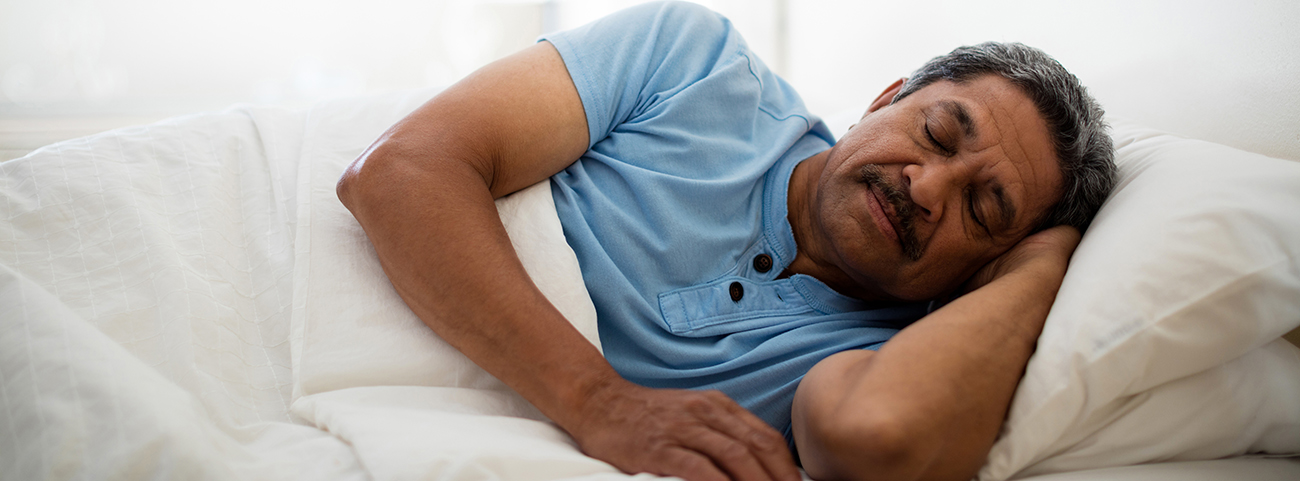Sleep
Your advice can help customers to prepare for sleep, get to sleep and stay asleep. All this will help them to wake up refreshed – ideally at the same time each day.
Having a relaxing wind-down routine can help with getting a good night’s sleep. Customers may be interested in products such as:
- Pillow sprays
- Balms, body lotions or oils designed to promote relaxation or sleep that can be massaged into the skin
- Bath soaks or essences to be used in a warm, not hot, bath.
Apps such as Headspace can be used for bedtime exercises and meditation. Relaxation CDs, reading a book or gentle yoga stretches can help with winding down. Writing a to-do list for the next day can help to calm a busy mind.
Sleep aids (e.g. promethazine or diphenhydramine tablets/liquid) can be used on a short-term basis to help relieve occasional sleeplessness. Herbal products such as those based on valerian are also available.
Having a comfortable sleep environment may help customers to sleep soundly. For customers who are disturbed by light or noise, eye masks and earplugs could be considered.
Activity
What products do you stock to help stop snoring?
Relaxation
You can give advice to customers looking for relaxation tips, such as taking a break, enjoying gentle exercise, getting creative (e.g. painting, sewing), spending time in nature, listening to and focusing on some favourite tunes, and breathing exercises.
Customers may also ask about adaptogens. Adaptogen is the term used to describe a range of holistic supplements derived from certain plants and mushrooms (e.g. turmeric, ashwagandha) and considered to have health benefits.1 They are believed to help the body ‘adapt’ to take on life pressures and are linked with stress relief.
Energise
Some people may find that they feel more tired in winter. The following may help:2
- Try to get more sunlight – open the blinds and windows early and spend time outdoors in the daylight as much as possible
- Aim for consistent bedtime and waking times, resisting the urge to sleep in when the mornings are colder and darker. Too much sleep can make people feel a bit lethargic. Exercise in the late afternoon can help reduce feelings of fatigue in the evening, as well as supporting a good night's sleep
- Keep eating a varied diet with plenty of fruit and vegetables, and don’t rely on sugary foods for a pick-me-up in the afternoons.
If someone is feeling persistently low, irritable or lethargic, sleeping more than usual and finding it hard to get out of bed, these could be signs of seasonal affective disorder (SAD). If you suspect a customer could have SAD, they should visit their GP.3
Following a healthy, balanced diet can help customers to keep up their energy levels. They may also be interested in supplements, e.g. those containing iron, magnesium or vitamin B12, that can contribute to the reduction of tiredness and fatigue.

Long COVID
Some customers may be concerned that they are affected by long COVID. Symptoms can include:4
- Fatigue
- Shortness of breath
- Chest pain/tightness
- Problems with memory or concentration
- Difficulty sleeping
- Joint pain or pins and needles
- Gastrointestinal issues.
Customers should be referred to their GP for a consultation if they think they have long COVID. Customers who are recovering and finding normal activities challenging should be advised to get plenty of sleep, eat well and conserve energy by slowing down.5
References:
1. https://www.webmd.com/balance/adaptogens-what-to-know
2. https://www.nhs.uk/live-well/sleep-and-tiredness/5-ways-to-wipe-out-winter-tiredness/
3. https://www.nhs.uk/mental-health/conditions/seasonal-affective-disorder-sad/overview/
4. https://www.nhs.uk/conditions/coronavirus-covid-19/long-term-effects-of-coronavirus-long-covid/
5. https://www.yourcovidrecovery.nhs.uk/your-road-to-recovery/managing-daily-activities/
References last accessed September 2021.

